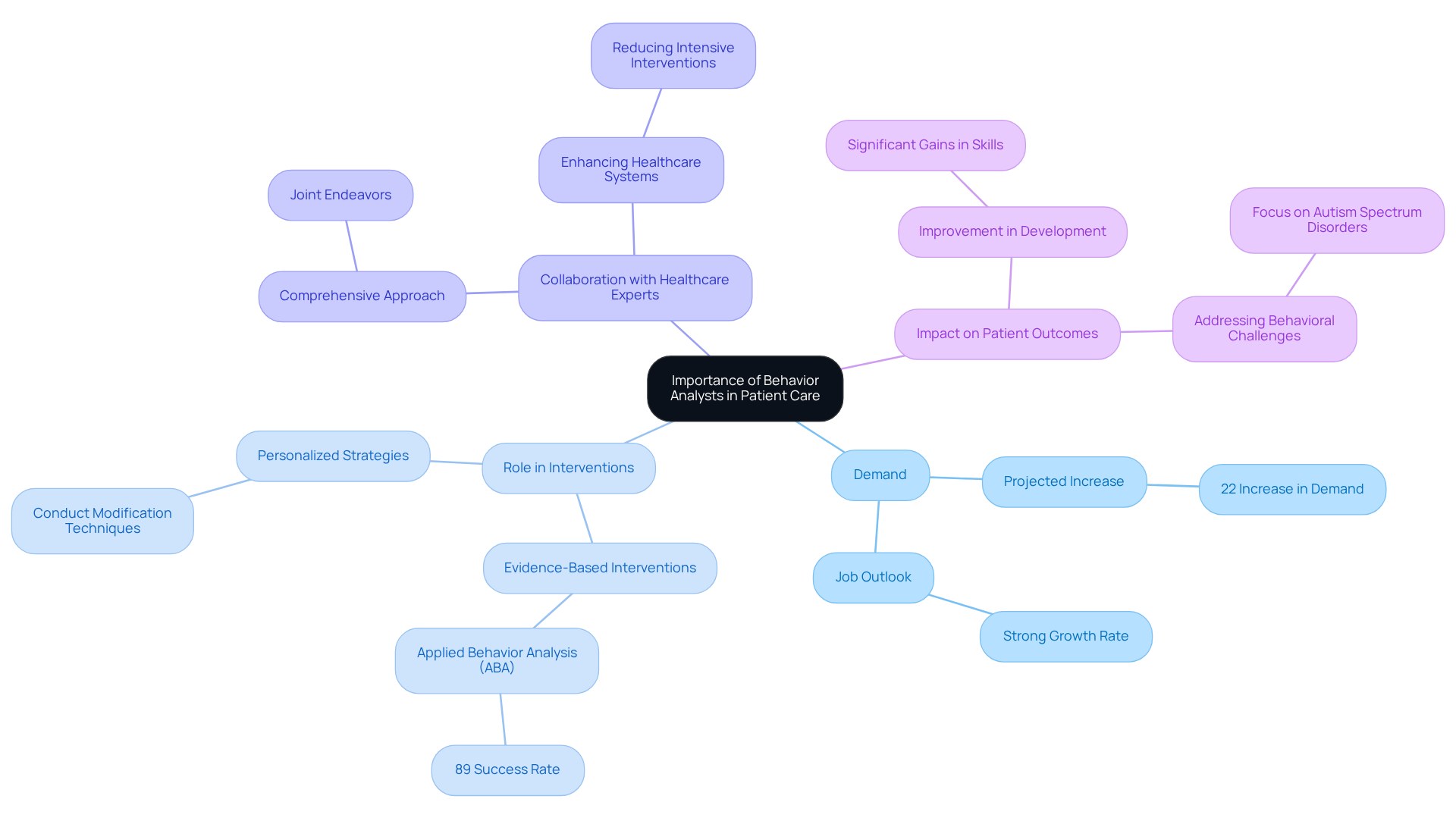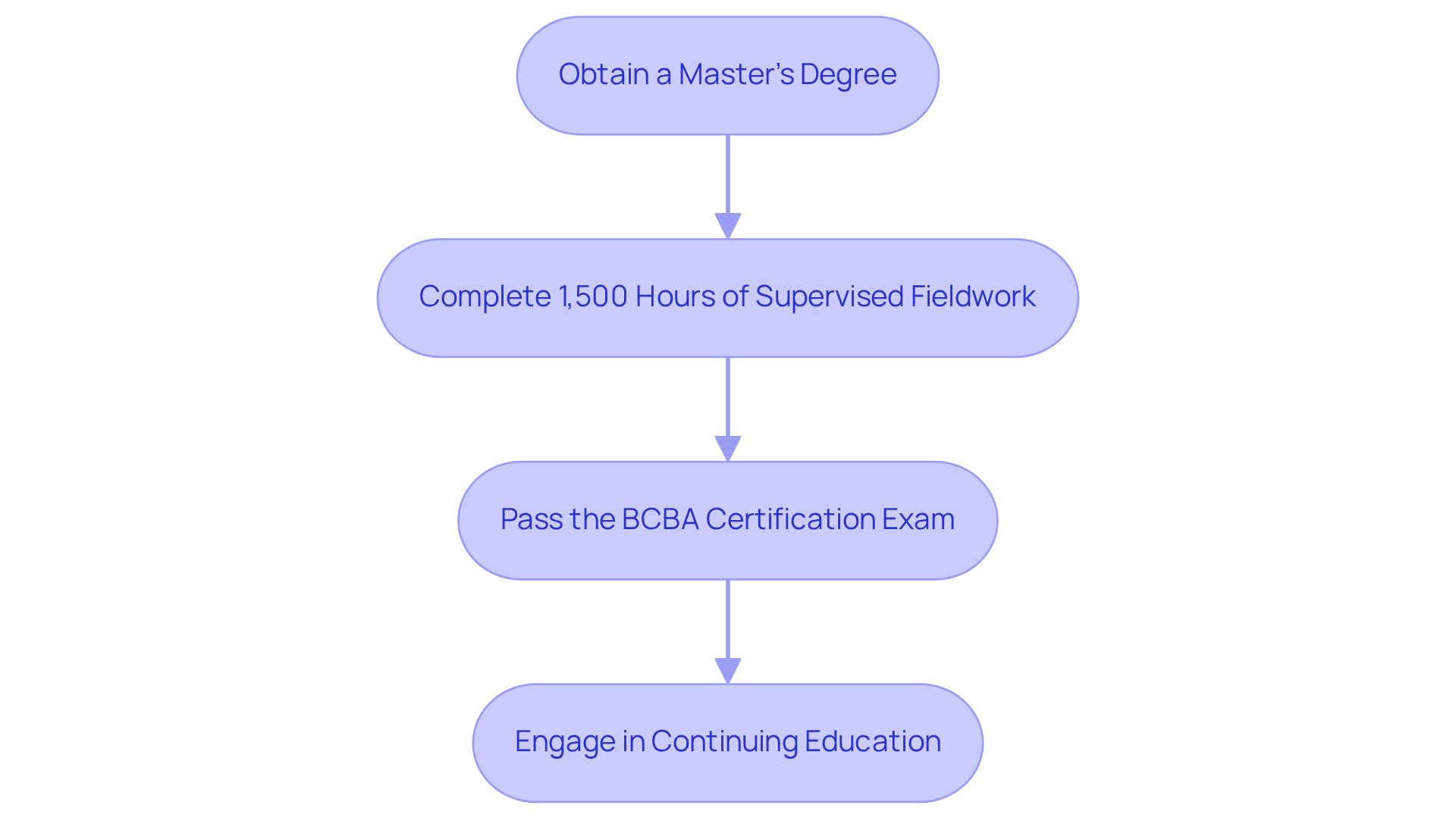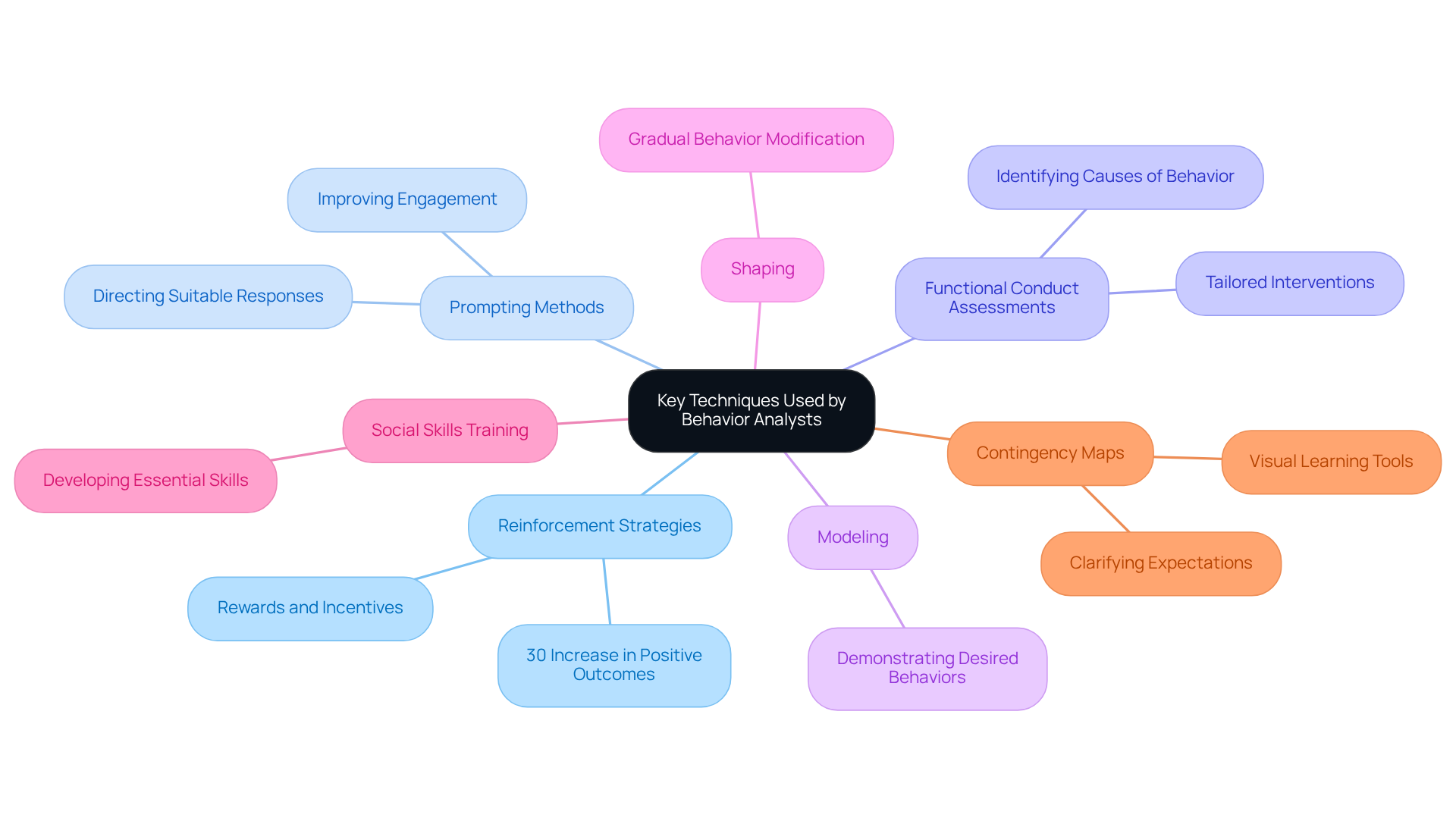September 30, 2025

Behavior analysts are essential in patient care, particularly for individuals with autism spectrum disorders. They evaluate client behaviors, develop personalized treatment plans, and implement targeted interventions aimed at modifying unhelpful habits. The significance of their role is underscored by compelling evidence of substantial improvements in client outcomes. Data reflecting high success rates in Applied Behavior Analysis (ABA) therapy illustrates their effectiveness in fostering overall patient development and well-being.
Consider the growing demand for Board Certified Behavior Analysts (BCBAs) in the healthcare sector. Organizations are increasingly recognizing the value these professionals bring to patient care. By utilizing platforms like Hire ABA for recruitment, healthcare employers can streamline the hiring process and ensure they attract top talent in the field.
Are you facing challenges in finding qualified behavior analysts? Reflect on your current hiring strategies and consider how Hire ABA can provide tailored solutions to meet your needs. With a focus on reliability and expertise, Hire ABA connects employers with skilled professionals who can make a significant impact on patient care.
In conclusion, the role of behavior analysts is crucial, and leveraging specialized recruitment services can enhance your organization's capabilities. Take action today to ensure you have the right professionals on your team, driving positive outcomes for your clients.
The escalating demand for behavior analysts in healthcare underscores a pivotal shift towards evidence-based practices that enhance patient outcomes. These professionals are instrumental in tackling behavioral challenges, especially for individuals with autism spectrum disorders, through the development of tailored interventions that drive positive change.
As the field progresses, critical questions emerge:
Delving into these inquiries highlights the essential contributions of behavior analysts in formulating effective treatment strategies and elevating the overall quality of healthcare.
Professionals in behavioral science are in high demand, with the need for Board Certified Analysts (BCBAs) projected to rise by around 22% over the next decade. These vital individuals apply the principles of conduct study to improve client outcomes, particularly through Applied Behavior Analysis (ABA) therapy. To understand what behavior analysts do, one must consider their primary responsibilities, which encompass:
By collaborating closely with individuals, families, and healthcare providers, specialists ensure that therapeutic strategies are not only effective but also tailored to meet the unique requirements of each individual. They continuously monitor progress, utilizing data collected during therapy sessions to make informed adjustments to treatment plans. This data-driven approach is substantiated by evidence indicating that 90% of children receiving show significant improvements, with many becoming indistinguishable from their peers.
The effectiveness of ABA therapy is further underscored by the significant job growth in the field, which reflects what behavior analysts do to address behavioral health conditions, particularly for individuals with autism spectrum disorders. As the profession evolves, practitioners are broadening their roles into research and policy-making, thereby enhancing their influence on care for individuals.
Are you facing challenges in hiring qualified professionals? Consider how Hire ABA can support your recruitment needs and ensure the best outcomes for your clients.

The demand for trained behavior analysts, and what do behavior analysts do in patient care, is projected to increase by approximately 22% in the coming years, highlighting their essential role.
What do behavior analysts do? They play a critical role in delivering evidence-based interventions that effectively address a variety of behavioral challenges, particularly in autism spectrum disorders and developmental disabilities. Their proficiency in conduct modification techniques illustrates what do behavior analysts do, as they design personalized strategies that foster positive changes, enhance communication skills, and improve social interactions. Research indicates that children receiving Applied Behavior Analysis (ABA) therapy often experience significant improvements in their overall development, with success rates exceeding 89%.
By collaborating with other healthcare experts, specialists adopt a comprehensive approach to care, which is vital for attaining optimal health results. This joint endeavor not only aids individual clients but also enhances the overall effectiveness of healthcare systems, decreasing the dependence on more intensive interventions. The rising prevalence of autism spectrum disorder, affecting approximately 1 in 36 children in the U.S., underscores the urgency for effective solutions.
Are you facing challenges in hiring qualified behavior analysts? Consider how Hire ABA can address these issues and streamline your recruitment process. With the growing need for expertise in this field, leveraging a reliable platform like Hire ABA can significantly and ensure that your practice remains at the forefront of behavioral health care.

The increasing demand for Board Certified Behavior Analysts (BCBAs) underscores what do behavior analysts do, highlighting the critical need for qualified professionals in the field. To achieve , candidates must first obtain a master's degree in behavior analysis or a closely related field. This educational foundation is further solidified by at least 1,500 hours of supervised independent fieldwork, ensuring the practical application of analysis principles.
Once these requirements are met, candidates must successfully pass the BCBA certification exam, which the Analyst Certification Board (BACB) indicates typically sees first-time pass rates between 60% and 70%. Candidates have the opportunity to attempt the exam up to eight times within a two-year eligibility window, underscoring the necessity of thorough preparation. Are you ready to invest in your future success?
Moreover, continuing education is essential for maintaining certification, keeping BCBAs informed about the latest research and best practices. This rigorous pathway not only equips practitioners with the vital skills needed to deliver high-quality patient care but also clarifies what do behavior analysts do, contributing to the overall job satisfaction reported by 94% of BCBAs, according to the BACB. By prioritizing professional development, you can enhance your career trajectory and ensure you remain at the forefront of the field.

Professionals in the field utilize a varied set of methods to promote change in actions, with a significant focus on practices supported by evidence. Among these, reinforcement strategies stand out for their effectiveness in modifying actions. By offering rewards or incentives, specialists promote desired actions, resulting in notable enhancements in client outcomes. Research indicates that clients exposed to motivational statements during therapy experience a 30% increase in positive behavioral outcomes, underscoring the power of reinforcement in practice.
In addition to reinforcement, prompting methods are employed to direct individuals toward suitable responses, thereby improving their capacity to engage in preferred actions. Functional conduct assessments play a crucial role in identifying the underlying causes of challenging actions, enabling analysts to develop targeted interventions tailored to individual needs. Data collection is essential in this process, as it allows therapists to monitor progress and assess the effectiveness of interventions over time.
Other techniques, such as modeling, shaping, and social skills training, further assist individuals in developing essential skills for daily functioning. For instance, the application of contingency maps has proven beneficial in teaching new skills visually, thus preventing issues and promoting learning. These maps serve as that help clarify expectations and reinforce learning. By integrating these evidence-based techniques, behavior analysts illustrate what do behavior analysts do to enhance the quality of life for their patients and contribute to their long-term success in various settings.

The demand for Board Certified Behavior Analysts (BCBAs) is projected to grow by an impressive 22% in the coming years, underscoring the crucial role these professionals play in healthcare. Behavior analysts employ specialized techniques rooted in the principles of Applied Behavior Analysis (ABA) to enhance patient care and improve outcomes. They not only evaluate client behaviors but also craft tailored treatment plans that address specific needs. Their collaborative approach with families and other healthcare providers ensures that interventions are effective and grounded in evidence, making a significant impact on the lives of those they serve.
The responsibilities of BCBAs encompass evaluating behaviors, developing personalized strategies, and utilizing data-driven methods to track progress. The effectiveness of their interventions, particularly for individuals with autism spectrum disorders, is well-documented, showcasing success rates that exceed 89% in developmental improvements. Furthermore, the comprehensive care they provide benefits individual clients and contributes to the overall efficiency of healthcare systems.
Given the growing prevalence of behavioral health challenges, the importance of behavior analysts cannot be overstated. Their commitment to evidence-based practices and ongoing professional development ensures they remain at the forefront of patient care. As the field evolves, there is a pressing need for qualified professionals to meet the increasing demand. Are you currently facing challenges in hiring skilled behavior analysts? Engaging with platforms like Hire ABA can facilitate the recruitment of these essential professionals, ultimately enhancing the quality of care provided to those in need. Embracing this expertise is essential for fostering positive change and improving health outcomes in communities everywhere.
What is the projected demand for Board Certified Analysts (BCBAs) in the next decade?
The demand for Board Certified Analysts (BCBAs) is projected to rise by around 22% over the next decade.
What are the primary responsibilities of behavior analysts in healthcare?
The primary responsibilities of behavior analysts include evaluating client actions, developing personalized treatment strategies, and executing focused interventions aimed at altering unhelpful habits.
How do behavior analysts ensure that therapeutic strategies are effective?
Behavior analysts collaborate closely with individuals, families, and healthcare providers to tailor therapeutic strategies to meet the unique requirements of each individual, continuously monitoring progress and making informed adjustments based on collected data.
What evidence supports the effectiveness of Applied Behavior Analysis (ABA) therapy?
Evidence indicates that 90% of children receiving intensive ABA therapy show significant improvements, with many becoming indistinguishable from their peers.
How is the role of behavior analysts evolving in the field of healthcare?
The role of behavior analysts is evolving to include broader responsibilities in research and policy-making, enhancing their influence on care for individuals, particularly those with behavioral health conditions and autism spectrum disorders.
What should organizations consider if they face challenges in hiring qualified behavior analysts?
Organizations facing challenges in hiring qualified professionals may consider utilizing services like Hire ABA to support their recruitment needs and ensure the best outcomes for their clients.
Our expert recruitment strategies and AI-driven sourcing ensure that you receive top-notch candidates quickly, without compromising on quality. Whether you’re looking for BCBAs, Clinical Directors, or RBTs, we’ve got you covered.